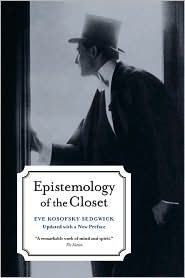
Sedgwick, Eve Kosofsky. Epistemology of the Closet. 1990. Berkeley: University of California Press, 2008.
Reviewed by J. d’Artagnan Love
Eve Kosofsky Sedgwick is one of the most notable writers in her field. In my first try at reviewing a piece of literary criticism I’ve found myself staring at a blank computer screen for a long while now. Sedgwick’s writing is a dizzying maze of nominalizations. It took me several tries to unpack this sentence: “Instead, I am trying to make the strongest possible introductory case for a hypothesis about the centrality of this nominally marginal, conceptually intractable set of definitional issues to the important knowledges and understandings of twentieth-century Western culture as a whole” (Sedgwick 2). Eventually, I became accustomed to her prose and, with a decently thick dictionary by my side, I was able to enter Epistemology of the Closet and come out alive.
Sedgwick focuses on the idea of the “closet” and the function that the “closet” performs in literature. The “closet,” if I have translated Sedgwick’s work accurately, is a sort of axis of power in homosexual identification and rhetoric. You can be “in the closet;” what Sedgwick describes as “the viewpoint of the closet,” or you can be aware of someone who is “closeted;” the “spectacle of the closet”. The “closet” functions as an open-secret of sorts.
The primary texts that Sedgwick works to explicate are themselves, dense and theory-heavy. She covers writers such as Oscar Wilde, Proust, Nietzsche and Melville. Her analysis of each text is interesting and thought-provoking, although, at points, overwhelming. This work would be much better appreciated if one has already read work by Wilde, Proust, Nietzsche and Melville. I’ve got three of the four writers under my belt and found that fourth section more challenging than the rest simply due to my own lack of knowledge of that specific writer. Sedgwick has assumed that her audience is already familiar with these writers so if you plan on digging into this text, come to the table prepared.
Epistemology of the Closet is a very challenging read and it is one of those texts that, no matter how many times one reads it, one can pull out something new from it or understand a part more clearly. That is part of the beauty of this book. It gets better each time you read it. (Trust me, I’ve had to read it on more than one occasion). Her work, I must admit, is daunting and not exactly the most accessible piece of writing I’ve come across. She writes in an obviously academic style which isn’t inherently a bad thing but could certainly be discouraging (and annoying) for those looking for a quick read.
3 darts out of 5.
No comments:
Post a Comment